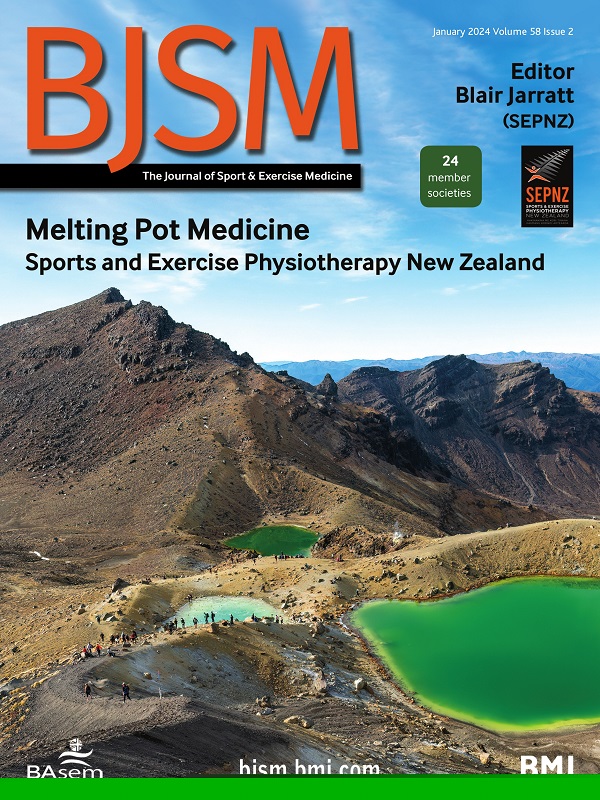Diagnostic effectiveness of the Sport Mental Health Assessment Tool 1 supplemented with a brief clinical intake interview in a cohort of Polish elite Olympic athletes
IF 11.6
1区 医学
Q1 SPORT SCIENCES
引用次数: 0
Abstract
Objective Several studies have used the Sport Mental Health Assessment Tool 1 (SMHAT-1) among athletes but none have combined SMHAT-1 with a subsequent clinical intake interview. The aim of this study was to evaluate the diagnostic effectiveness of SMHAT-1 supplemented by a brief, in-person clinical intake interview in evaluating the prevalence of mental health concerns in elite athletes. Methods Sections 1 and 2 from SMHAT-1 were administered in person during the routine biannual medical check-up for Olympic athletes at the National Centre for Sports Medicine in Poland. Immediately after completing the measures, all athletes were interviewed by qualified psychologists who evaluated their mental health and provided recommendations. Results A total of 1121 elite athletes (545 female, 576 male) aged 18–53 (M=24.39, SD=5.09) were evaluated 2–8 months before the 2024 Paris Olympic Games; 72.4% scored above the triage threshold and 51% were positively screened in SMHAT-1’s section 2. Based on the subsequent mental health evaluation, only 9.5% showed signs of persistent mental health concerns and required referral to a mental health specialist. In 24.2%, their distress levels/symptoms were assessed as occasional and normal in relation to demands, and they underwent a psychoeducational intervention or were advised to consult a sports psychologist. Female athletes scored significantly higher in most questionnaires. Conclusion SMHAT-1 proved a useful addition to the routine medical check-ups for elite athletes. Extending SMHAT-1 with a brief clinical intake interview substantially elevated the efficacy of the mental health evaluation, with an additional benefit of raising mental health literacy. All data relevant to the study are included in the article or uploaded as supplementary information. All data were anonymised and shared [online supplemental file 2][1]. [1]: #DC3运动心理健康评估工具 1 辅以简短临床接诊访谈对波兰奥运精英运动员队列的诊断效果
目的 有几项研究在运动员中使用了运动心理健康评估工具 1(SMHAT-1),但没有一项研究将 SMHAT-1 与随后的临床接诊访谈相结合。本研究的目的是评估运动心理健康评估工具 1 的诊断效果,并辅以简短的面对面临床接诊访谈,以评估精英运动员心理健康问题的普遍性。方法 在波兰国家运动医学中心对奥林匹克运动员进行一年两次的例行体检时,当面施测 SMHAT-1 的第 1 和第 2 部分。完成测量后,所有运动员都会立即接受合格心理学家的访谈,由他们对运动员的心理健康进行评估并提出建议。结果 在 2024 年巴黎奥运会举办前 2 至 8 个月,共有 1121 名年龄在 18 至 53 岁之间的精英运动员(女性 545 人,男性 576 人)(M=24.39,SD=5.09)接受了评估;72.4% 的运动员得分超过了分流阈值,51% 的运动员在 SMHAT-1 第 2 部分中得到了积极筛查。根据随后的心理健康评估,只有 9.5%的人表现出持续的心理健康问题,需要转诊至心理健康专家。有 24.2%的人,他们的痛苦程度/症状被评估为偶尔出现且与需求相关的正常情况,他们接受了心理教育干预或被建议咨询运动心理学家。女性运动员在大多数问卷中的得分都明显较高。结论 SMHAT-1 被证明是对精英运动员常规体检的有益补充。通过简短的临床入院访谈来扩展 SMHAT-1 大大提高了心理健康评估的效果,同时还能提高心理健康素养。与该研究相关的所有数据均包含在文章中或作为补充信息上传。所有数据均已匿名并共享[在线补充文件 2][1]。[1]:#DC3
本文章由计算机程序翻译,如有差异,请以英文原文为准。
求助全文
约1分钟内获得全文
求助全文
来源期刊
CiteScore
27.10
自引率
4.90%
发文量
217
审稿时长
3-8 weeks
期刊介绍:
The British Journal of Sports Medicine (BJSM) is a dynamic platform that presents groundbreaking research, thought-provoking reviews, and meaningful discussions on sport and exercise medicine. Our focus encompasses various clinically-relevant aspects such as physiotherapy, physical therapy, and rehabilitation. With an aim to foster innovation, education, and knowledge translation, we strive to bridge the gap between research and practical implementation in the field. Our multi-media approach, including web, print, video, and audio resources, along with our active presence on social media, connects a global community of healthcare professionals dedicated to treating active individuals.

 求助内容:
求助内容: 应助结果提醒方式:
应助结果提醒方式:


